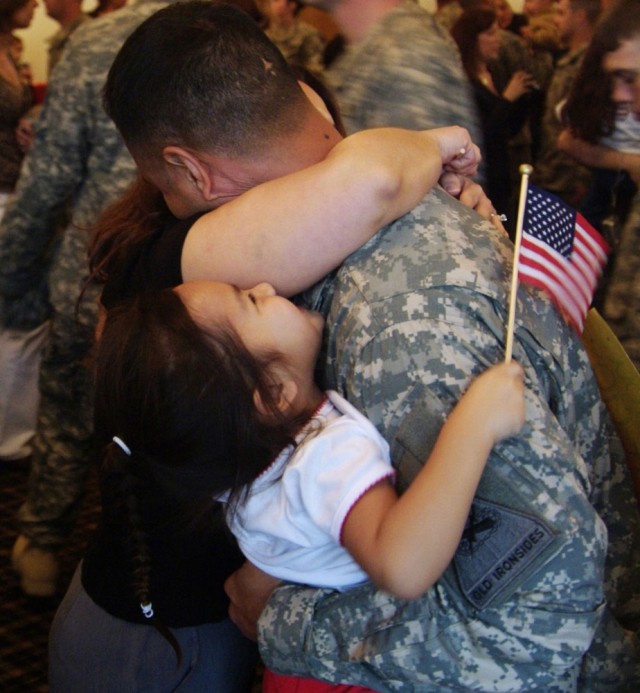
HEIDELBERG, Germany - As the Global War on Terrorism moves into a seventh year, its impact on the U.S. military community goes well beyond the battlefield.
Indeed, servicemembers and their Families are feeling the brunt of war at home, especially as the call to serve downrange increases.
As Gen. George Casey, the Army chief of staff, said in August: "What we are seeing is ... the cumulative (result) of repeated deployments on Families and on Soldiers."
The general recalled a spouse at Fort Bragg, N.C., telling him that it was the not the same in running a family readiness group the third time as it was the first, as there are cumulative stress and strains. Meaning, "We have to do progressively more so that our Families and Soldiers are well taken care of," Casey stressed.
With that mindset, roughly 100 counseling professionals recently gathered at Bad Kreuznach, Germany, with the goal of "breaking new ground in the delivery of community counseling services across (the theater)," said Maj. Heidi Whitescarver, chief of U.S. Army Europe's Soldier and Family Readiness Branch.
Organizations represented at the Deployment-Related Community Counseling Conference included: USAREUR G1, Installation Management Command-Europe, Department of Defense Dependents Schools-Europe and Europe Regional Medical Command.
As she addressed the participants in her opening remarks, Whitescarver urged them to "begin with the end in mind," which would be a group response to these two questions:
*How could they improve their current level of counseling, considering what resources are available (such as personnel and facilities)'
*If you had all the additional resources you wanted, how would you improve the delivery of counseling services'
"By bringing representatives from a cross section of agencies, we wanted to identify and share best practices in counseling - as well as develop new methods to strengthen the delivery of current and future services," Whitescarver said.
Throughout three and a half days, attendees representing a cross section of agencies - Army Community Service, Family Readiness Groups, Rear Detachment Commands, Chaplains, Army Substance Abuse Program, Behavioral Health and Social Work Services - listened to guest speakers while also exchanging ideas in open forums.
Presentations were presented on such programs as:
Battlemind Training System: An initiative to alert Soldiers of the stress brought about by combat and to assist detecting possible mental health issues before and after deployments. It also readies Families for "the demands and challenges of a deployment," as well as preparing them for reunion and reintegration, said Maj. Dennis McGurk of the U.S. Army Medical Research Unit-Europe.
Warrior Transition Units: Organizations that are being activated at three installations in Germany (Landstuhl, Heidelberg and Vilseck) that will provide command and control, primary care and case management of injured Soldiers, assisting them in their healing and promoting a return to duty or transition to civilian life.
Task Force Guardian: A unit from Schweinfurt, Germany, gives a new look to Rear Detachments that provide for Families and remaining Soldiers from deployed units. Its commander, Lt. Col. Robert Whittle, considers TFG a combat multiplier that supports the 2nd Dagger Brigade Combat Team - which returns from Iraq in November - while partnering closely with higher headquarters and U.S. Army Garrison Schweinfurt.
Warrior Pride for Life: A U.S. Army Garrison Kaiserslautern project that focuses on reducing substance abuse by using persuasion-based teaching, including interactive presentations and small-group discussion.
Military Family Life Consultants: A contract service that provides short-term problem resolution for Family, deployment, adjustment and marital issues. It also supports reintegration and reunion activities.
Conference participants spent eight hours in small groups brainstorming ideas and developing recommendations that answered the two questions that Whitescarver posed on the first day. Most of the recommendations centered on normalizing mental health, collocating counseling services, developing a single position responsible for the coordination of mental health services in a community and creating a marketing campaign that encourages Soldiers to seek counseling services.
"The participants put in a lot of hard work developing recommendations based on the two questions," Whitescarver said. "The challenge for the key organizers of the conference is to put their recommendations in motion so that this is not 'just another conference'."

Social Sharing